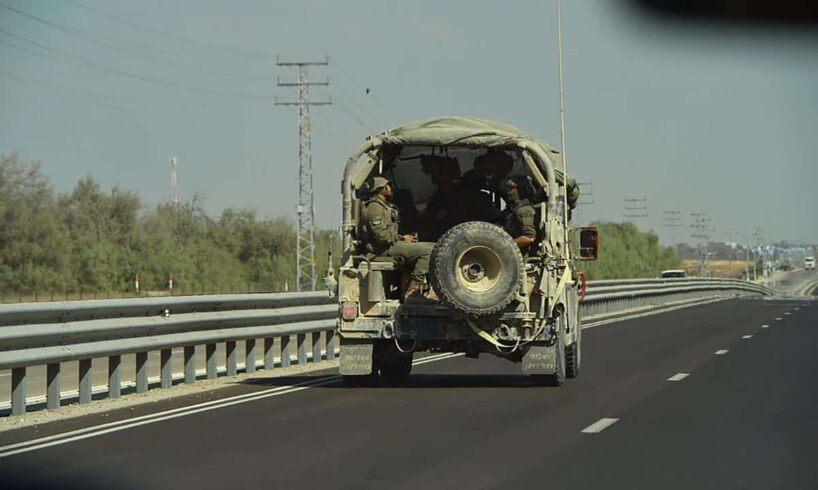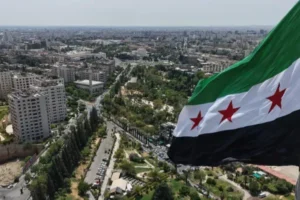
The ceasefire between Israel and Hamas faced new challenges as it entered its third week, with both sides accusing the other of violating the agreement.
While Hamas handed over the remaining 20 living hostages within 72 hours of the ceasefire taking effect, as of Tuesday, it had handed over only 15 of the 28 bodies of hostages it was holding. Hamas insists that it is having trouble finding or accessing the remaining 13 bodies, but Israeli officials say the terrorist movement already has at least some of the bodies and is deliberately dragging its feet. Over the past few days, Israel has allowed Egyptian teams to enter Gaza with heavy machinery to aid the effort to find and return the hostages.
Israel has responded to the delay in the handover of the bodies by limiting the planned increase in humanitarian aid to Gaza and delaying the reopening of the Rafah Crossing between Egypt and Gaza. Hamas argues that these actions are a violation of the ceasefire, while Israel says they’re only responses to Hamas.
On Tuesday, the crisis was exacerbated after Hamas returned remains it said belonged to one of the 13 remaining hostages. However, Israeli authorities discovered that the remains actually were connected to a hostage whose body had already been returned.
Several clashes have also been reported since the beginning of the ceasefire, with the IDF conducting several strikes on individuals who crossed the line that the military withdrew to in Gaza as part of the deal. The line, known as the “yellow line,” still isn’t clearly marked in several locations, although the IDF is working to set up clearer signs marking the line.
⭕️IDF troops have begun marking the Yellow Line in Gaza to establish tactical clarity on the ground.
As part of the ceasefire agreement and in accordance with the directive of the political echelon, the marking consists of a concrete barrier placed approx. every 200 meters with… pic.twitter.com/76GaFg66cG
— Israel Defense Forces (@IDF) October 20, 2025
The most significant challenge to the ceasefire came at the beginning of last week, after terrorists launched anti-tank missiles and fired at Israeli forces in the Rafah area of southern Gaza, killing two IDF soldiers and wounding several others. Simultaneously, the IDF shot two individuals who attempted to cross the Yellow Line in northern Gaza.
Israel responded with airstrikes on several sites across Gaza and threatened to halt the entry of aid into the Strip until further notice. After an intervention by the United States, the decision to halt aid was overturned.
At first, media outlets run by Hamas claimed that the Israeli forces were attacked while Hamas’ anti-dissident unit was targeting an anti-Hamas militia in Rafah. However, Hamas later denied any direct responsibility for the attack, claiming that it hadn’t had contact with its forces in the area since March.
U.S. officials working to keep ceasefire from collapsing
A series of American officials visited Israel over the past week to pressure Israeli officials to maintain the ceasefire despite the difficulties the agreement has faced.
U.S. special envoy Steve Witkoff and U.S. President Donald Trump’s son-in-law, Jared Kushner, visited Israel at the beginning of last week, and Vice President J.D. Vance arrived immediately after on Wednesday for a two-day visit. Right after Vance left, U.S. Secretary of State Marco Rubio landed in the country.
Vance, Witkoff, and Kushner all expressed optimism about the peace plan’s chances of success despite its setbacks so far.
Some news outlets described the string of visits as “Bibi-sitting” (Bibi is Prime Minister Benjamin Netanyahu‘s nickname).
Analysts expressed concerns that American political officials were holding direct meetings with Israeli military leaders, saying it appeared as if the White House was giving direct orders or direct supervision to Israeli forces. The presence of an international base in Israel has also deepened those concerns.
Netanyahu and Vance downplayed those concerns during the vice president’s visit. Vance stressed that the U.S. sees the relationship with Israel as a partnership, not as a vassal state. Netanyahu stressed on Thursday that while he appreciates U.S. support, Israel is “an independent state.”
Vance stressed that the U.S. would not “force anything” on Israel concerning “foreign troops on their soil.” He added that while Turkey, one of the countries expected to have a role in post-war Gaza, has served as a central supporter for Hamas, “No one who is a party to this conflict can look in the past and not point at something that they don’t like or that they disagree with. The way that we’re going to get to peace is to focus on the future, which is what the president of the United States has asked us to do, and we think everybody here is very willing to do that and is very eager to engage in that effort.”
“We will not impose foreign troops on Israeli soil, but we believe Turkey can play a constructive role. We’re grateful for the role they’ve already been playing,” said US Vice President JD Vance at a press conference during his Israel visit pic.twitter.com/nrNXooWBb1
— i24NEWS English (@i24NEWS_EN) October 21, 2025
The vice president emphasized that it’s impossible to put an explicit deadline on the different steps of the plan because of the complexity of the situation. He described Gaza as being split into two regions at the moment, one which is incredibly dangerous (seemingly a reference to the Hamas-controlled side) and one which is relatively safe (an apparent reference to the Israel-controlled side). Vance noted that the role of the international security force is going to be to expand the safe area.
Concerns about American control over Israel were also exacerbated after the U.S. responded with outrage to two bills voted on by the Knesset concerning applying Israeli sovereignty to parts of the West Bank.
The bills were passed in a preliminary reading on Wednesday. One of the bills would apply sovereignty to Ma’ale Adumim, an Israeli city east of Jerusalem, while the other would apply sovereignty to most, if not all, of the West Bank. The bills would need to pass three more rounds of votes in the Knesset to become law.
Netanyahu’s Likud party abstained from the votes, although one Likud parliamentarian, Yuli Edelstein, voted in favor of the bills despite the prime minister’s order to abstain. The Likud condemned the vote, calling it a “deliberate political provocation by the opposition to sow discord during Vice President JD Vance’s visit to Israel.” While the bills were sponsored by opposition members, coalition members – including government ministers – voted in favor of the bills.
On Wednesday, Rubio warned that the votes on the bills could potentially threaten the Gaza peace deal.
“So they’re a democracy, they’re going to have their votes, people are going to take these positions, but at this time it’s something that especially we think it might be counterproductive…We’re concerned about anything that threatens to destabilize what we’ve worked on,” Rubio said.
Vance expressed outrage at the votes on Thursday, calling the move a “stupid political stunt” and saying he saw it as a personal insult. “The policy of the Trump administration is that the West Bank will not be annexed by Israel,” the vice president stressed.
סגן נשיא ארה”ב ואנס בנתב”ג על הצעת החוק להחלת ריבונות: “זה היה מוזר. הייתי די מבולבל. אמרו לי שזו הצבעה סמלית. אמרו לי שזה תעלול פוליטי, ואם זה המצב – זה ממש מטופש ואני נעלב מזה באופן אישי. מדיניות ממשל טראמפ היא שהגדה המערבית לא תסופח”@RamEliBrandts pic.twitter.com/tLjJyWza9N
— כאן חדשות (@kann_news) October 23, 2025
Additionally, on Thursday, Trump stressed in an interview with Time Magazine that an Israeli annexation of the West Bank “won’t happen.”
“It won’t happen because I gave my word to the Arab countries. And you can’t do that now. We’ve had great Arab support. It won’t happen because I gave my word to the Arab countries. It will not happen,” said Trump, warning that “Israel would lose all of its support from the United States if that happened.”
Later in the day, in response to a question about the votes, Trump insisted that “Israel’s not going to do anything with the West Bank…Israel’s doing very well.”
In response to the outrage from the U.S., coalition chairman Ofir Katz announced that all laws concerning sovereignty over the West Bank would be frozen until further notice.
“Yesterday, Prime Minister Netanyahu clearly instructed me that the coalition should not vote on the bills regarding sovereignty. Coalition discipline was imposed on all members of the coalition regarding the matter. Because there were Knesset members who acted contrary to the Prime Minister’s instructions, the bills passed. As a result, the Prime Minister instructed me not to advance these bills until further notice,” Katz said.
In comments to Israel’s Channel 12 news on Thursday, a senior American official noted that the vote and several other incidents over the past week have “intensified the concern in the White House that the behavior of the Israeli government will bring about the collapse of the Gaza agreement.”
The official warned that “Netanyahu is walking on a very fine line with President Trump. If he continues like this, he will mess up the deal, and if he messes up the deal — Donald Trump will mess him up.”
Saudi normalization remains out of reach
Another incident cited by the official was comments by Finance Minister Bezalel Smotrich made in response to reports that Saudi Arabia would not normalize relations with Israel without concrete steps toward the establishment of a Palestinian state. Smotrich responded, “If Saudi Arabia tells us normalization in exchange for a Palestinian state, my friends, I will not accept it. Continue to ride camels in the desert in Saudi Arabia.”
Several hours later, Smotrich issued an apology, saying his statement was “less successful” and “out of place.” He stressed, however, that he is “not willing to accept hypocrisy.”
“Just as I do not want, God forbid, to harm the Saudis, I expect them not to harm me or us,” Smotrich said. “Anyone who denies our very deep and living connection to the homeland in Judea and Samaria harms us. Anyone who tries to force us unilaterally to tear the Land of Israel apart, to divide it, to establish a terrorist state in it that will endanger our existence and our future harms us. All these moves that Saudi Arabia has been promoting in recent times are many times more offensive than an unplanned and unsuccessful statement.”
A source in the Saudi royal family told N12 earlier this month that “there will be no normalization with Israel without a two-state solution.” The source added that “seemingly this won’t happen under the current Netanyahu government, but maybe there will be an opportunity around the end of October 2026, meaning a little over a year from now, if a new government accepts the two-state principle.”
What happens next?
The question of how to disarm Hamas and remove it from power has been a central issue in discussions surrounding the future of the peace plan. Several Arab states have warned that they will not commit troops to secure Gaza unless Hamas is disarmed. The terrorist movement, in turn, has insisted that it will never surrender its weapons and rejected the idea of an international force entering Gaza.
Many of the countries being asked to contribute troops are demanding further clarity about the force’s mission and are refusing to take part if they’ll need to fight Hamas. If the international force is unable or unwilling to disarm Hamas and it’s unwilling to disarm on its own, it’s unclear how the peace plan will move forward.
Despite the reports, Trump insisted in a post last Tuesday that numerous countries in the Middle East have “explicitly and strongly” said they would “welcome the opportunity” to go into Gaza with heavy force and “‘straighten [out] Hamas’ if Hamas continues to act badly.”
“There is still hope that Hamas will do what is right. If they do not, an end to Hamas will be FAST, FURIOUS, & BRUTAL!” Trump wrote.
Last week, the head of Egyptian intelligence, Hassan Rashad, visited Israel and met with Netanyahu and other Israeli officials to discuss the next phases of the peace plan.
Sky News Arabia reported that several disagreements arose between Netanyahu and Rashad. Netanyahu rejected an Egyptian demand to allow Palestinian security personnel trained in Egypt and Jordan into Gaza and rejected the possibility of Turkey contributing troops to the international security force. Reportedly, no agreements were reached during the visit.
The Wall Street Journal reported on Wednesday that one plan the U.S. and Israel are considering would have Gaza divided into separate zones controlled by Israel and Hamas. Reconstruction would only begin in areas under Israeli control until Hamas could be disarmed and removed from power.
The report noted comments Kushner made during a press conference last Tuesday, in which he stressed that “no reconstruction funds will be going into areas that Hamas still controls.” Kushner explained that reconstruction would be focused on the areas Israel controls, giving Gazans a place to work and live within those areas.
The plan has sparked concerns among Arab states, who feel it could lead to permanent Israeli control of parts of Gaza. The report stressed that Arab states were unlikely to commit troops to a force in Gaza under these conditions.
U.S. Central Command announced last week that it had opened a Civil-Military Coordination Center as the main coordination hub for humanitarian and security aid to Gaza and to supervise the implementation of the ceasefire agreement.
“Bringing together stakeholders who share the goal of successful stabilization in Gaza is essential for a peaceful transition,” said CENTCOM Commander Adm. Brad Cooper. “Over the next two weeks, U.S. personnel will integrate representatives from partner nations, non-governmental organizations, international institutions, and the private sector as they arrive to the coordination center.”





